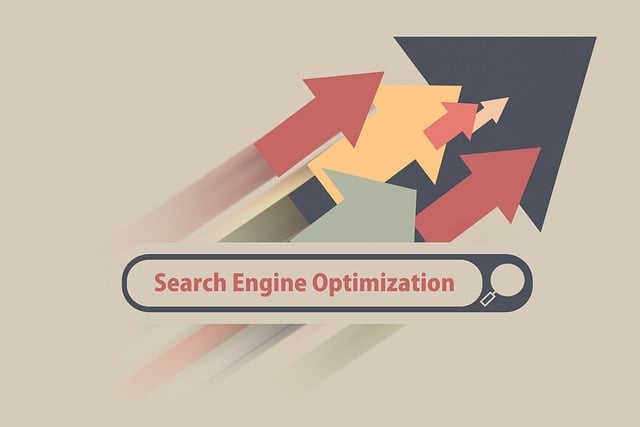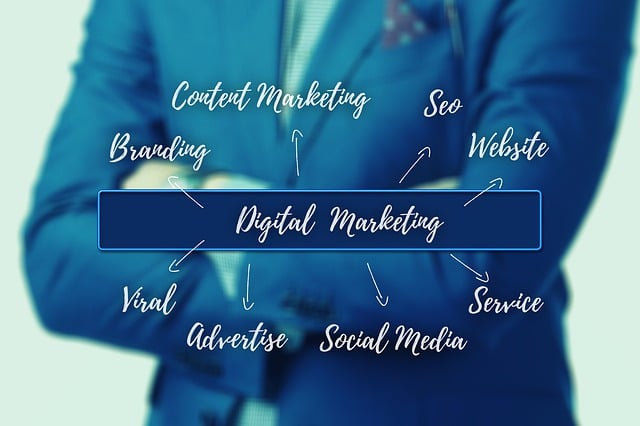Off-Page SEO is a strategic approach that enhances your search engine rankings through activities outside of your website. This article delves into the essential techniques shaping your online visibility. From building quality backlinks, leveraging social media, and influencer marketing, to guest blogging and brand mentions, we explore proven strategies for Off-Page SEO success. Learn how online directories and competitor analysis play a role, and discover effective methods for measuring and tracking your progress.
Understanding Off-Page SEO: The Basics

Off-Page SEO refers to all activities conducted outside of your website that impact your search engine rankings. It’s about building authority and credibility in the eyes of Google by securing high-quality backlinks from reputable sources, engaging in social media interactions, and participating in industry forums or communities. These efforts signal to search engines that your content is valuable and trustworthy, leading to improved visibility and higher search results.
The basics involve identifying relevant online platforms where your target audience hangs out, creating compelling content that naturally attracts links, and actively reaching out to gain backlinks. It’s a strategic process that requires understanding your industry, recognizing influential websites, and consistently producing shareable assets. By focusing on these off-page elements, you can significantly enhance your website’s search engine optimization performance.
Building Quality Backlinks: A Cornerstone Strategy

Building quality backlinks is a cornerstone strategy in off-page SEO, as it significantly impacts your website’s visibility and ranking on search engines. High-quality links from reputable sources act as votes of confidence, signaling to algorithms that your content is valuable and trustworthy. This can lead to increased organic traffic, improved domain authority, and better overall performance in search results.
To achieve this, focus on creating engaging, shareable content that naturally attracts backlinks. Guest blogging, where you contribute articles to other websites in your niche, is a popular method. Additionally, building relationships with influencers and industry leaders can lead to mentions and links from their sites. Remember, the quality of these links matters more than quantity; ensure they are relevant to your niche and come from authoritative domains.
Utilizing Social Media for SEO Enhancement

In today’s digital era, social media platforms offer a powerful tool for enhancing Off-Page SEO strategies. By leveraging these channels effectively, businesses can increase their online visibility and attract a wider audience. Social media provides an opportunity to engage with potential customers, build relationships, and share valuable content that aligns with search engine optimization (SEO) best practices. When users interact with your brand on platforms like Twitter, Facebook, or LinkedIn, it signals to search engines that your website is active, relevant, and worthy of higher rankings.
Sharing informative posts, engaging in conversations, and collaborating with influencers can drive organic traffic back to your site. Additionally, social media platforms facilitate the distribution of quality backlinks, which are a critical component of Off-Page SEO. By consistently posting optimized content and interacting with users, you can create a buzz around your brand, increase website authority, and ultimately boost your search engine rankings.
Impact of Influencer Marketing on Search Rankings

In the realm of Off-Page SEO, influencer marketing has emerged as a powerful strategy to boost search rankings. When top influencers in a particular niche promote a brand or product, it generates significant social proof and drives organic traffic. This form of word-of-mouth marketing creates a buzz around the brand, leading to increased visibility and credibility on search engines. Influencers’ established audiences trust their recommendations, which can directly translate into higher conversion rates and improved search rankings over time.
The impact of influencer collaborations extends beyond immediate sales. Quality content created by influencers often includes relevant keywords and backlinks, both of which are essential factors for SEO success. As search engines crawl through these linked resources, they gather valuable signals that reinforce the brand’s authority on specific topics. This indirect effect can push websites higher in search results, even outside of direct influencer promotions, making it a strategic component of any Off-Page SEO campaign.
Guest Blogging: A Powerful Off-Page Technique

Guest blogging is a highly effective Off-Page SEO technique that allows businesses and individuals to reach a broader audience while establishing their authority in their industry. By contributing valuable content to reputable websites within their niche, guest bloggers can attract new visitors to their own site. This strategy not only drives traffic but also helps build backlinks, a critical component of Off-Page SEO. Backlinks from high-quality sources enhance a website’s search engine rankings by signaling to algorithms that the site is a reliable and trustworthy source of information.
Furthermore, guest blogging provides an opportunity to connect with industry influencers and potential partners. Engaging in this practice can lead to collaborative efforts, such as joint projects or cross-promotion, further amplifying the brand’s online visibility. As search engines continue to prioritize user experience, high-quality, relevant backlinks remain a powerful signal for ranking higher in search results, making guest blogging an indispensable tactic within the broader Off-Page SEO strategy.
The Role of Online Directories and Listings

Online directories and listings play a pivotal role in Off-Page SEO strategies. These platforms serve as digital maps, connecting businesses to their target audiences by providing essential information like addresses, operating hours, and services offered. When a business is consistently listed on relevant and reputable directories, it enhances its online visibility and establishes a solid local presence.
Search engines, particularly Google, rely on these directories to gather and verify business details. By having accurate and optimized listings, businesses can improve their chances of appearing in local search results, driving more targeted traffic. Moreover, quality directories often feature user reviews and ratings, which not only influence search engine rankings but also build trust and credibility among potential customers.
Brand Mentions and Their SEO Benefits

Brand mentions, whether in blog posts, news articles, or social media updates, serve as powerful Off-Page SEO tools. When reputable sources link back to your website or mention your brand by name, it signals search engines that your business is a trusted and relevant resource. This positive association boosts your website’s authority and visibility, making it more likely to rank higher in search results.
Each brand mention carries SEO weight, contributing to a larger backlink profile. These mentions not only drive traffic to your site but also create opportunities for diverse keyword exposure. When other websites reference your brand, they often include related keywords naturally, further enhancing your website’s search engine optimization and attracting potential customers from various sources.
Analyzing Competitor Backlink Profiles

Analyzing competitor backlink profiles is a crucial aspect of effective Off-Page SEO strategies. By examining the backlinks that your competitors have acquired, you can gain valuable insights into their successful SEO campaigns. This process allows you to understand which websites and content types are gaining traction within your industry, enabling you to tailor your own off-page efforts accordingly.
Competitor analysis reveals not only the number of backlinks but also their quality and relevance. High-authority sites linking to competitors can indicate opportunities for collaboration or content promotion. Conversely, identifying low-quality or spammy backlinks can help you avoid similar pitfalls and improve the overall health of your own backlink profile.
Measuring and Tracking Off-Page SEO Success

Measuring the success of Off-Page SEO efforts is crucial for understanding what tactics drive organic growth. Key performance indicators (KPIs) can help gauge the impact of external signal manipulation, such as link building and social media engagement. Tools like Google Analytics and Search Console provide insights into referral traffic, click-through rates, and keyword rankings, allowing marketers to track changes over time.
By analyzing backlink profiles, including the quality and quantity of incoming links, professionals can assess the effectiveness of Off-Page SEO strategies. Additionally, monitoring social media mentions and brand mentions across the web offers valuable context about public sentiment and exposure. Regular reporting and adjustments based on these metrics are essential to refining Off-Page SEO campaigns and ensuring they align with broader digital marketing goals.
